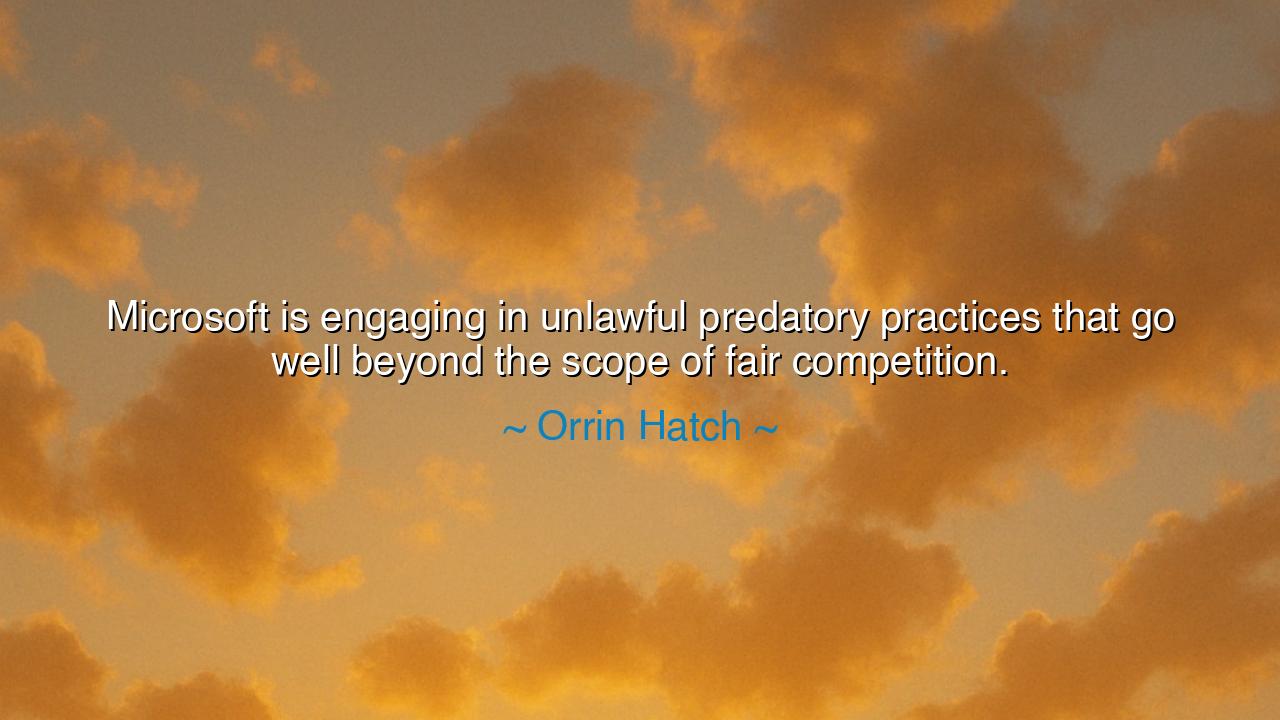
Microsoft is engaging in unlawful predatory practices that go
Microsoft is engaging in unlawful predatory practices that go well beyond the scope of fair competition.






Hear the fierce rebuke of Orrin Hatch, elder of the Senate and guardian of law, who declared: “Microsoft is engaging in unlawful predatory practices that go well beyond the scope of fair competition.” These words were spoken in the heat of battle, not with swords, but with markets, contracts, and codes of law. They resound as a warning from the halls of power: that when a mighty company seeks not only to compete, but to crush, it oversteps the sacred boundaries of justice and threatens the balance upon which free enterprise rests.
For competition is the lifeblood of progress. It is the contest of ideas, the testing of strength, the sharpening of skill. When fair, it brings invention, lowers prices, and strengthens the many. But when it turns to predatory practice, it becomes no longer a noble duel, but an ambush. It is the lion not hunting in the wild, but caging the prey so none may escape. Hatch’s words were aimed at the giant of Redmond, accusing it of using its vast power not to innovate alone, but to suffocate rivals, binding markets in chains of monopoly.
The origin of these words lies in the great antitrust struggle of the late 20th century. Microsoft, by then the ruler of operating systems, was accused of using its dominance in Windows to crush competitors in software markets—most famously, its bundling of Internet Explorer to overwhelm Netscape. It was not the invention of a better product that won the day, but the leveraging of power to block the path of others. Thus Hatch, echoing the ancient guardians of balance, raised his voice to say: This is no longer fair contest; this is conquest by force disguised as commerce.
History has seen this pattern before. Recall the tale of Standard Oil, the empire of John D. Rockefeller. With ruthless efficiency, it seized pipelines, undercut rivals, and built a monopoly so vast it strangled competition across the land. For a time, it seemed untouchable, yet eventually the law rose up and broke it apart, scattering its pieces into new companies. Here again, the warning of Hatch fits: when giants reach too far, their hunger leads them to violate fairness itself, and in doing so, they draw the judgment of history.
The deeper meaning of Hatch’s cry is that law must stand above power. In markets as in nations, strength without restraint becomes tyranny. If competition is to be true, it must be bound by rules that protect the weak as well as the strong, the small innovator as well as the mighty empire. For if all is permitted to the giant, the field becomes barren, invention withers, and the many are left to serve the few. The law exists to remind the mighty: you are not beyond the reach of justice.
The lesson for us, then, is both civic and personal. In our own lives, let competition be honorable, let striving be fair. Do not seek victory through deception, nor crush others when you could instead rise by merit. And in our societies, let us guard against unchecked power, whether of company, ruler, or system. For freedom survives only when fairness is defended, and prosperity grows only when the field of play is open to all.
Take action, beloved listener. In your dealings, honor justice. Support systems that protect fair play, not only for yourself, but for those who come after. Celebrate innovation, but question conquest when it silences rivals. For though giants may walk the earth, the law and the people must remind them that even the tallest tree is still rooted in soil it does not own.
Thus the voice of Orrin Hatch endures, sharp and resolute: “Microsoft is engaging in unlawful predatory practices that go well beyond the scope of fair competition.” Hear this not only as history, but as a timeless teaching—that power without fairness leads to ruin, but power guided by justice leads to flourishing. May we choose the latter, in markets, in nations, and in our own hearts.






AAdministratorAdministrator
Welcome, honored guests. Please leave a comment, we will respond soon